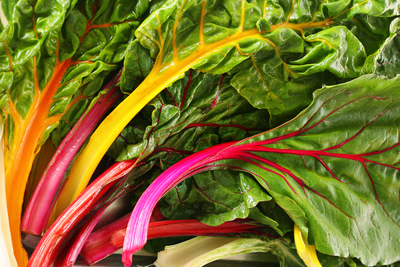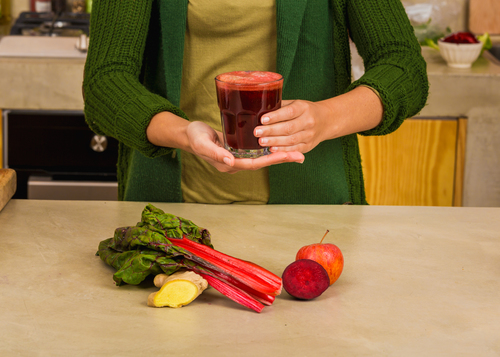
Swiss chard like many dark leafy greens is a nutritional powerhouse. It may not get the same attention as hipster leafy greens such as kale but it holds its equal merit.
Loaded with a variety of anti-inflammatory antioxidants such as alpha-carotene, beta-carotene, lutein and zeaxanthin -- plus the antioxidants vitamin A, C and E -- Swiss chard provides protection against inflammatory diseases like cardiovascular disease and cancer.
Not limited to that its health benefits include promoting healthy hair, skin, nails, eyes and bones, lowering blood pressure, diabetes management and improving endurance during exercise.
So let's take a closer look at what regular consumption of Swiss chard juice has to offer us.
(Check out our bumper article about the 101 benefits of juicing).
Contrary to its name Swiss Chard is not a native of Switzerland. It is found naturally in countries near the Mediterranean Sea (Croatia, France, Greece, Italy), in North Africa (Algeria, Egypt, Libya, Morocco, Tunisia) and the Middle East (Iran, Iraq, Lebanon, Syria, Turkey).
The first records of the use of Swiss chard date back around 2,500 years. Since then this nutrient-rich plant's popularity has led to its naturalization in most regions of the world today.
1 cup (36g) of raw chopped swiss chard provides:
Diets that are low in 3 key minerals -- calcium, potassium and magnesium -- are a major risk factor for developing high blood pressure.
Our muscles need these minerals to contract and relax correctly and this includes our "arterial muscles" that are required to pump blood around the body. This dilation of the arteries, plus these minerals' ability to help release sodium from the body, are considered the key factors for helping keep blood pressure within a healthy range.
Swiss chard is very good at pulling minerals from the soil and thus its leaves are a very good source of calcium, magnesium and potassium, and numerous other essential minerals.
Additionally, Swiss chard contains inorganic nitrates that are shown to help lower blood pressure as well as contribute to overall vascular health.
A deficiency of vitamin K is a key risk factor for the development of osteoporosis and is associated with a greater risk of bone fractures.
Adding Swiss chard or its juice to your diet is a sure way of getting more than your daily needs of vitamin K - it contains about 3 times the daily recommended allowance of this vitamin! 1 cup of Swiss chard provides 298 mcg of vitamin K. The recommended daily allowance for women is 90 mcg and 120 mcg for men.
Beets became famous for their athletic improving ability after a study found that beet juice improved athletic performance in cyclists.
This study found that beet juice improved performance by 2.8% (11 seconds improvement) in a 4-kilometer (2.5-mile) time trial and a 2.7% (45 seconds improvement) in a 16.1-kilometer (10-mile) trial. The study spawned numerous beet-based supplements aimed at athletic performance.
So why are we talking about beets in an article that is dedicated to the benefits of drinking Swiss chard juice? A good question.
It is the nitrates in beets that create this exercise endurance benefit and Swiss chard (being from the beet family) has a similar nitrate content as beets.
Nitrates are turned into nitric oxide in the body and this improves the oxygenation of the muscles. Essentially the muscles can "breathe" better and thus endure more exercise.
As with many green leafy vegetables, Swiss chard is a good option for diabetic diets. Besides being a great source of fiber (which is important for diabetic diets) this vegetable contains a type of flavonoid antioxidant called syringic acid.
This flavonoid has been found to inhibit the activity of a digestive enzyme called alpha-glucosidase. This inhibitory effect decreases the amount of carbohydrates that are broken into simple sugars, thus helping to maintain stable blood sugar levels.
Carrots may be the food we most associate with eye health, but dark leafy greens such as Swiss chard also contain vitamins and antioxidants that are crucial to good eye health.
The foundation of strong healthy hair is undoubtedly nutrition.
Aftercare products, shampoo and conditioner do play a vital role, however, they only work best if we give our hair the nutrition to begin with.

There are some vitamins, minerals and antioxidants that are crucial to providing healthy hair. Additionally, these same nutrients are important for skin health too!
Let's take a look at some of these important nutrients that a daily dose of Swiss chard provides us
Swiss chard juice is a good source of 2 vitamins that boost the immune system, vitamins A and C. It is also a fair source of vitamin E, another vitamin that supports the immune system. Let's check them out:
Swiss chard is a great source of a family of carotene antioxidants that include alpha-carotene, beta-carotene, lutein and zeaxanthin.
These antioxidants have been shown to possess strong anti-inflammatory benefits, protecting cells from oxidative (free-radical) damage to cells that cause inflammatory responses linked to cardiovascular disease and cancer.
A daily alkaline, antioxidant-loaded Swiss chard juice can go a long way to protecting us from a variety of diseases.
Given its very high vitamin K content, Swiss chard may not be a good option for those taking blood-thinners like Warfarin and Coumadin.
Vitamin K plays an important part in blood clotting to heal wounds and can have a countereffect on these drugs. As always check with your doctor before changing your diet if you are using these medications.

Both Swiss chard and beetroot contain nitrates proven to help increase endurance in athletes.
This juice used both these vegetables plus an apple for sweetness and balanced flavor. A little ginger is added for kick and its potent anti-inflammatory properties to help keep things as "cool" as possible while working out.
This juice reaps the benefits of several dark leafy greens to provide a juice loaded with antioxidants that provide anti-inflammatory and anti-cancer benefits and so much more.
This is the Swiss version of the classic V8 juice recipe. This also shares some of the nitric oxide power of juice recipe #1 above because it contains beets (an integral ingredient in a V8 recipe) and Swiss chard, 2 veggies high in natural inorganic nitrates.
Swiss chard is a very good source of vitamin A (well it actually has beta-carotene, an antioxidant that is converted to vitamin A in the body) with 1 cup providing 2202 IU, 44% of the recommended daily allowance.
Since this recipe features 1 cup of Swiss chard then we have almost half of our daily vitamin A needs covered.
This juice takes things a step further however with a few carrots.
A single medium-sized carrot (61g) features a whopping 10190 IU of vitamin A. That's 204% of the recommended allowance. We will be using 2 carrots for this recipe so that brings us to about 450% of the recommended daily allowance!
Thus, this Swiss chard juice recipe is going to be of great benefit to our eye health given the importance of vitamin A for protecting our eyes from disease.
You see what we did there ^^^^. This green juice combines green grapes with Swiss chard just to make a juice with a fun name.
On the practical side, the green grapes add sweetness to the Swiss Chard to make for a pleasant juice.
Note that you don't have to get Chardonnay grapes, any green grape will do! Try to get organic grapes though, non-organic grapes are heavily sprayed with pesticides.